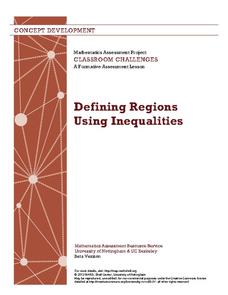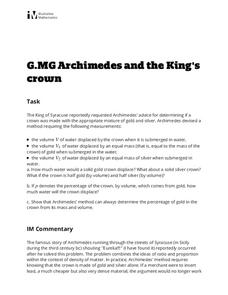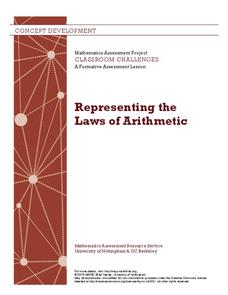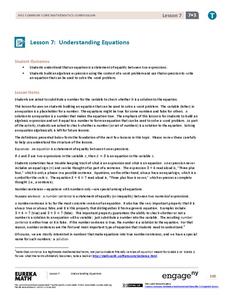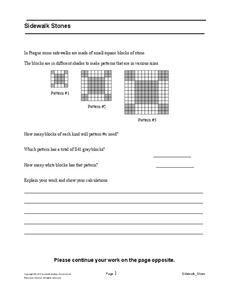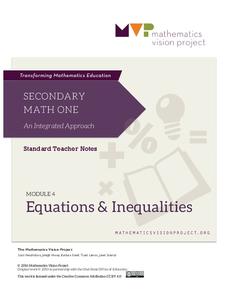Illustrative Mathematics
Placing a Square Root on the Number Line
There are many ways to approach finding the rational approximation of an unknown square root. Here is a problem that will help math learners make a connection between square roots and their order on a number line. As usual, determine two...
MARS, Shell Center, University of Nottingham
Defining Regions Using Inequalities
Your young graphers will collaboratively play their way to a better understanding of the solution set produced by the combining of inequalities. Cooperation and communication are emphasized by the teacher asking questions to guide the...
Illustrative Mathematics
Archimedes and the King's Crown
Learners will shout "Eureka!" in this quick but deep activity replicating the famous bathtub experiment of Archimedes. Given the scenario of a king with a suspected fake crown, young investigators develop formulas using density to...
Mathematics Assessment Project
Representing the Laws of Arithmetic
Sixth graders connect numerical expressions to geometric area. They first complete an assessment task requiring them to identify area models for numerical expressions. Learners then participate in an activity to match area models to...
Mathematics Assessment Project
Maximizing Area: Gold Rush
Presenting ... the gold standard for a lesson. Learners first investigate a task maximizing the area of a plot for gold prospecting. They then examine a set of sample student responses to evaluate their strengths and weaknesses.
Mathematics Assessment Project
Representing Inequalities Graphically
A new, improved version of the game Battleship? Learners graph linear inequalities on the coordinate plane, then participate in a game where they have to guess coordinate points based on the solution to a system of linear...
Mathematics Assessment Project
Classifying Equations of Parallel and Perpendicular Lines
Parallel parking might be difficult, but finding parallel lines is fairly simple. In this lesson plan, learners first complete an assessment task involving parallel and perpendicular lines in the coordinate plane. Individuals then take...
EngageNY
End-of-Module Assessment Task — Precalculus (Module 1)
A transformational assessment determines how far pupils are advancing toward mastering complex and matrix standards. The assessment checks the learners' understanding of linear transformations, complex numbers and the complex plane,...
EngageNY
End-of-Module Assessment Task: Grade 8 Module 4
Connect proportional linear equations and systems. The seven-question assessment is the last installment in a 33-part series. The items cover comparing proportional relationships, slope concepts, and simultaneous linear...
EngageNY
Mid-Module Assessment Task: Grade 7 Module 2
A seven-question assessment determines how well your learners understand the procedures to add, subtract, multiply, and divide signed rational numbers. Pupils show their understanding through problem-solving situations.
EngageNY
Mid-Module Assessment Task: Grade 7 Mathematics Module 3
Lesson 16 in the series of 28 is a mid-module assessment. Learners simplify expressions, write and solve equations, and write and solve inequalities. Most questions begin as word problems adding a critical thinking component to the...
EngageNY
Percent Increase and Decrease
Increase the percent of pupils that are fluent in solving change problems with an activity that asks class members to look at problems that involve either increases or decreases and to express the change in terms of the percent of...
Noyce Foundation
First Rate
Explore distance and time factors to build an understanding of rates. A comprehensive set of problems target learners of all grade levels. The initial problem provides distance and time values and asks for the winner of a race. Another...
EngageNY
Problems in Mathematical Terms
Whether scholars understand independent and dependent variables depends on you. The 32nd installment of a 36-part series has learners analyze relationships in real-world problems through tables. They determine independent and dependent...
CCSS Math Activities
Smarter Balanced Sample Items: 7th Grade Math – Target C
Pupils may be able to simplify expressions, but do they understand how to simplify an expression? A PowerPoint presentation gives several examples of Smarter Balanced Assessment items that test learners' understanding of the concept....
New York City Department of Education
Dance and Text
Use texts and dances to teach inequalities and equations. A sixth-grade unit covers using variables in equations and inequalities to solve problems. Learners show what they know at the end of the unit using two performance tasks, one...
EngageNY
Does Every Complex Number Have a Square Root?
Help the class find a better way. Pupils recall finding nth roots or a complex number in polar form from a previous module to find the square root of a complex number. Using the second installment in a series of 23, scholars discover it...
EngageNY
Graphing Solutions to Inequalities
Activate the strengths of your visual learners using an informative instructional activity. In the 15th installment of the series of 28, pupils graph their solutions on number lines to create a visual representation of solutions....
EngageNY
Solving Inequalities
Investigate complex problem situations by applying inequalities. Building from concepts explored in the previous lesson plan, learners read word problems and develop inequalities to represent the situation. They then solve the...
EngageNY
Understanding Equations
After examining expressions in the first six lessons of the series, learners are now ready to apply those concepts to create equations in the seventh installment of 28. Each exercise contains a conceptual situation that helps build an...
University of Utah
Analyze and Solve Linear Equations
Solve any issues you have with solving linear equations. Learners solve linear equations in one variable, starting with two-step equations, in the first chapter of a 10-part eighth-grade workbook series. They then progress to equations...
Mathematics Assessment Project
Table Tiling
How many total tiles does it take to tile a table top? Learners apply geometric concepts to determine the number of tiles needed for a specific square table top, and then use the result to create expressions for the number of tiles...
Mathematics Assessment Project
Sidewalk Stones
One block, two blocks, white blocks, gray blocks. In the high school assessment task, learners investigate patterns of sidewalk stones to develop a quadratic expression for each colored block. Young mathematicians then use the expression...
Mathematics Vision Project
Equations and Inequalities
Help learners get their facts in line to build and solve complicated linear equations and inequalities. Pupils build upon their knowledge of solving basic equations and inequalities to solve more complex ones. Individuals work with...

